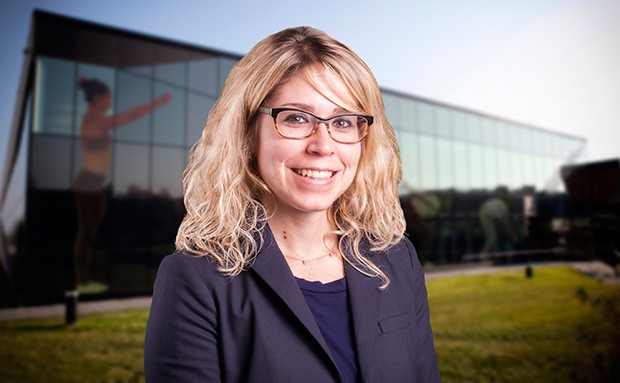Good news for your wonky back
 Maryse Fortin studies the spine. She hopes to find ways to ease chronic back pain.
Maryse Fortin studies the spine. She hopes to find ways to ease chronic back pain.
If you’ve ever suffered from back pain, you’re not alone. Up to 85 per cent of the population will have an episode of lower back pain at some point in their lifetime, and the recurrence rate is very high.
The good news is that Maryse Fortin — a postdoctoral associate in preventive health research at Concordia’s PERFORM Centre — is studying the spine in order to find methods of easing chronic back pain.
The PERFORM Centre promotes healthier lives through research opportunities, education and preventive-based programs.
Using PERFORM’s imaging suite, Fortin is comparing the changes that happen to back muscles between people with chronic back ailments and those without pain.
“What seems to be happening is an atrophy — a wasting of the muscle — and a change in muscle composition in those suffering,” Fortin explains. “Currently, I’m developing methods to quantify these changes using MRI and ultrasound imaging and comparing them between people with different spine conditions.”
The hope is that understanding changes to muscle composition will help prevent atrophy from occurring in the first place, as well as inform better rehabilitation programs.
“Back pain is the second most common reason to consult a doctor,” says Fortin. “It’s expensive to treat and leads to time off work. Not only is solving this problem a quality of life issue, it’s also an economic one.”
Fortin came to Concordia via McGill University where she was working with orthopaedic spine surgeons as a postdoctoral fellow. She obtained her PhD in Rehabilitation Science from the University of Alberta in 2013 and is a Concordia alumna in Exercise Science.
“Maryse is exactly the type of young scientist PERFORM is looking to attract,” says Louis Bherer, scientific director of the centre. “She is a dynamic researcher dedicated to improving the quality of life of the general population.”
Fortin welcomed the opportunity to return to Concordia to continue her academic career at PERFORM.
“The centre has a lot of potential given the numerous platforms all under one roof,” she says. “What I also like is the student engagement in research, which is something I really want to ensure happens as part of my work.”
Find out more about research taking place at Concordia’s PERFORM Centre.